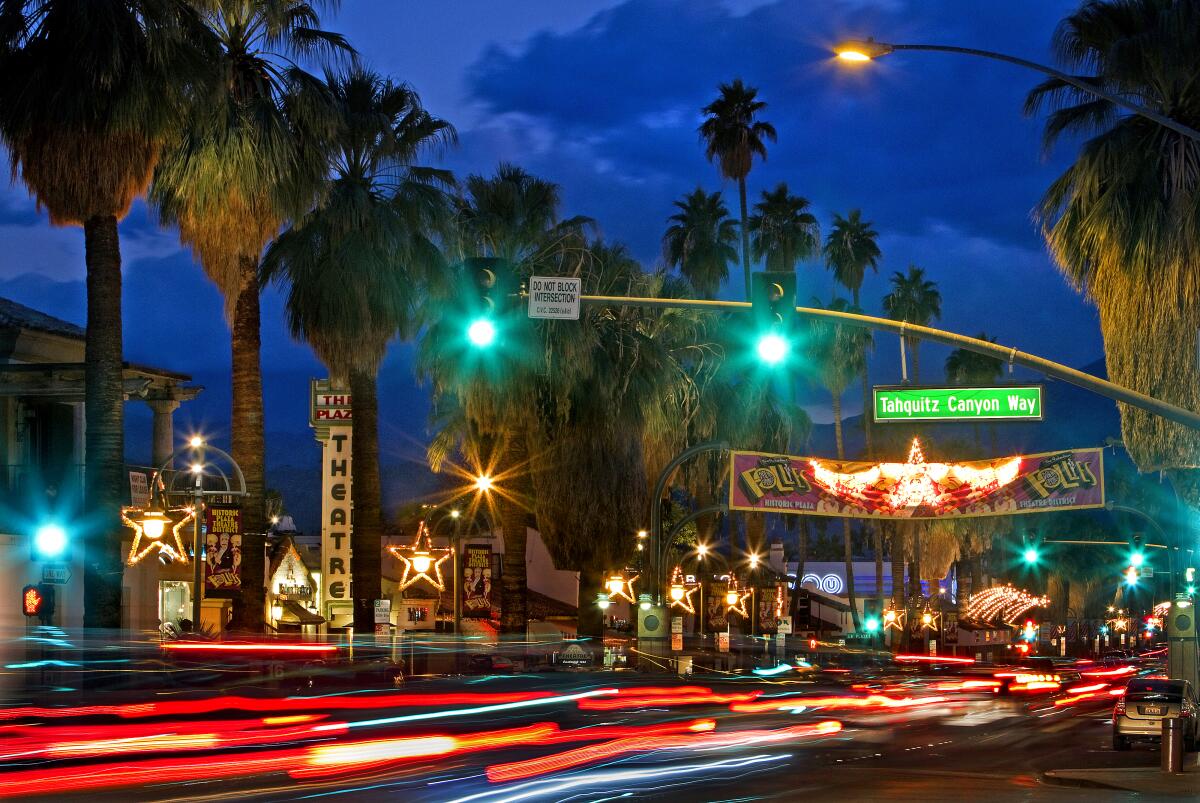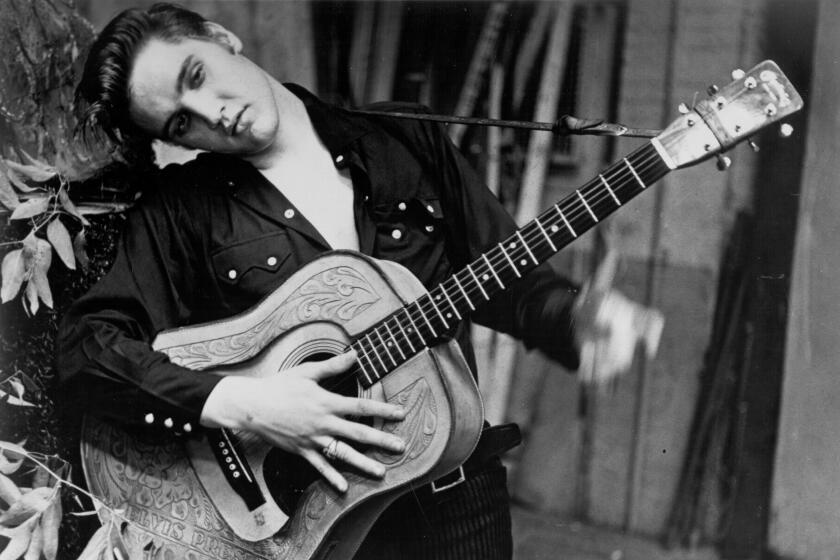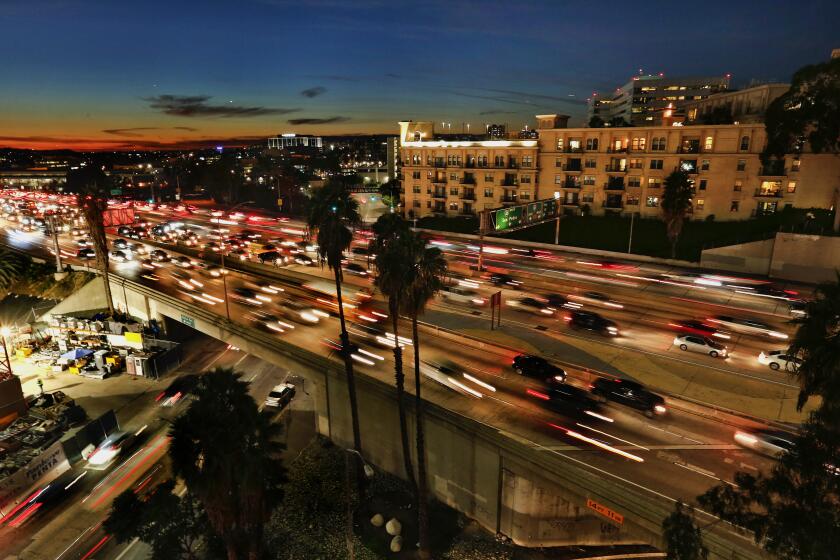As the new year approaches, finding peace in the desert, among my family’s ghosts

- Share via
Time moves differently in the desert this time of year. The sun slips behind Mt. San Jacinto around 4 and its shadow slides across the Coachella Valley, cloaking everything in hazy light. Other locals typically avoid coming to downtown Palm Springs during the holiday season, but I cherish these moments there when the calendar has narrowed to a precious few days.
It feels like the desert invariably warms in the weeks before the new year, the air filled with the scent of fall blooming roses. A shift in the breeze is often enough to draw me to the glittery streets that are crowded with the architecture of the past and the people of today. There’s something almost dreamlike in finding myself in the same place as each year eventually falls away.
Downtown Palm Springs is alive with tourists, all moving with the sun-drunk slowness of vacation. When you live in a resort city, you get used to this stop-action, though you never stop being slightly annoyed by it, and my family has been here since the late 1950s.
They were some of the early Jews who settled in Canyon Country Club, one of the few places where someone with my last name could belong. Decades later, my grandfather, Poppa Cy, would drive me through town, point out the window at various enclaves, telling me, “Never live there.” There was no malice, just a simple declaration. He’d found his place, I would find mine, it just wouldn’t be behind that gate or in that mountain cove.
The mixed emotions of the holidays have helped create some wonderful music that reminds us that together we can ‘muddle through, somehow.’
The desert is loath to tear anything down, so its buildings of Jewish oppression still stand. Tour groups go through them during Modernism Week. I’ve thought of this often this year, when antisemitism flowed openly from the internet, to politicians and celebrities, to the real estate agent showing my mother-in-law a new home, who told her she could “Jew-down” the seller, as my wife held me back from saying something I might regret. Or might not. What’s true in the desert is that, depending on where you stood, if you were to close your eyes in 1962 and open them in these last moments of 2022, you might not know the difference, physically or intellectually.
These might not seem like the memories to hold close, but the reality is that my grandparents came here for a reason: They felt at peace. Even after dementia felled Poppa Cy, he often still thought he was on his patio staring into Andreas Canyon, or on the Back Nine, each place a small mitzvah. I’m the only one in the family to have inherited that sense of peace, the last of us living here, walking downtown on a warm December day, reckoning with the ghosts.
I think it’s because light melancholy centers me in a way very few things do. It tells me bad times get better. It reminds me that my petty yearnings make me small, that I am capable of forgiving in much the same way my grandparents must have been in order to live through a single day on these streets.
My Mexican grandparents, Japanese grandmother and English grandfather from India became Angelenos. I try to hold on to their memories in this city.
I walk into a tourist trap shop — nearly everything in the store says “Palm Springs” on it in a retro-1950s font — and circle through. Years ago, this was a poorly lit bookstore called Bookland. Word was, Truman Capote and Herman Wouk used to come in to buy out-of-town newspapers and retired Chicago Outfit gangster Tony Accardo liked their crossword puzzle selection.
I never saw any of them there, but where there are now racks of T-shirts, I can see my 12-year-old self, thumbing through paperbacks of my idols. Running my fingers over the words of Robert B. Parker, Donald Westlake and Elmore Leonard, Hanukkah money burning a hole in my pocket, Poppa Cy double-parked on Palm Canyon in his yellow convertible, top down, hand resting on his side mirror, sunglasses on, a slick of suntan lotion spread across his nose, shirt unbuttoned halfway down his chest.
“How are you today?”
There’s a salesperson — a young woman — standing a few feet away from me, straightening some shirts.
“Wistful.”
“Is that good or bad?”
I gesture around the store. “This used to be a bookstore. I used to sit right here and read books.”
“Is that right?” she says.
Is that right? I walk back outside. Look up and down the block. The shadow of Mt. San Jacinto has darkened the street. Headlights flicker on. The temperature has dropped below 70, enough to send a chill through me. Maybe Bookland had been on the next block. Maybe it doesn’t matter. Maybe if I wait long enough, my grandfather will pull up and we’ll cruise down the canyon again, letting go of it all.
Tod Goldberg is an author, most recently of “The Low Desert: Gangster Stories.” He directs the Low Residency MFA Program in Creative Writing and Writing for the Performing Arts at UC Riverside. @todgoldberg
More to Read
A cure for the common opinion
Get thought-provoking perspectives with our weekly newsletter.
You may occasionally receive promotional content from the Los Angeles Times.












